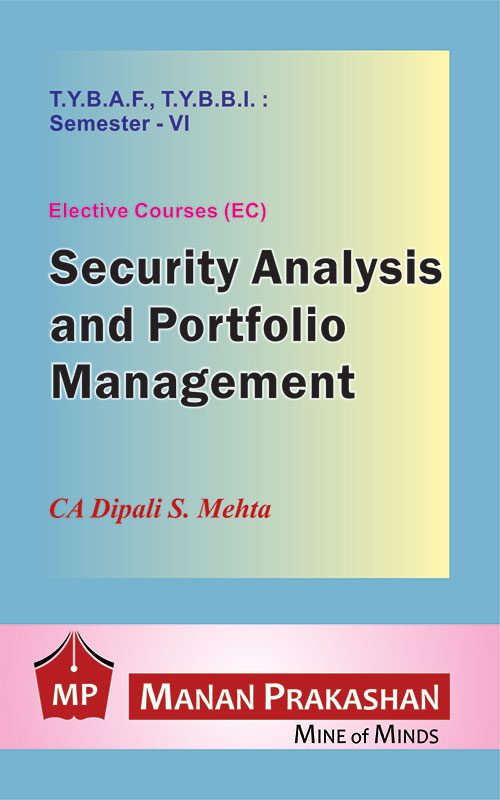Security Analysis and Portfolio Management –
TYBAF/TYBBI Semester VI
Content:
TYBAF Syllabus
1. Portfolio Management – An Introduction and Process (12 Lectures)
l Investment : Meaning, Characteristics, Objectives, Investment v/s Speculation, Investment v/s Gambling and Types of Investors
l Portfolio Management : Meaning, Evolution, Phases, Role of Portfolio Managers, Advantages of Portfolio Management
l Investment Environment in India and Factors Conducive for Investment in India
l Portfolio Analysis : Meaning and its Components, Calculation of Expected Return and Risk, Calculation of Covariance, Risk-Return Trade-off
l Portfolio Selection : Meaning, Feasible Set of Portfolios, Efficient Set of Portfolios, Selection of Optimal Portfolio, Markowitz Model, Limitations of Markowitz Model, Measuring Security Return and Portfolio Return and Risk under Single Index Model and Multi Index Model
TYBAF Syllabus
1. Portfolio Management – An Introduction and Process (12 Lectures)
l Investment : Meaning, Characteristics, Objectives, Investment v/s Speculation, Investment v/s Gambling and Types of Investors
l Portfolio Management : Meaning, Evolution, Phases, Role of Portfolio Managers, Advantages of Portfolio Management
l Investment Environment in India and Factors Conducive for Investment in India
l Portfolio Analysis : Meaning and its Components, Calculation of Expected Return and Risk, Calculation of Covariance, Risk-Return Trade-off
l Portfolio Selection : Meaning, Feasible Set of Portfolios, Efficient Set of Portfolios, Selection of Optimal Portfolio, Markowitz Model, Limitations of Markowitz Model, Measuring Security Return and Portfolio Return and Risk under Single Index Model and Multi Index Model
2. Portfolio Management – Valuation (12 Lectures)
l Portfolio Revision : Meaning, Need, Constraints and Strategies
l Portfolio Evaluation : Meaning, Need, Measuring Returns (Sharpe, Treynor and Jensen Ratios) and Decomposition of Performance
l Portfolio Revision : Meaning, Need, Constraints and Strategies
l Portfolio Evaluation : Meaning, Need, Measuring Returns (Sharpe, Treynor and Jensen Ratios) and Decomposition of Performance
3. Fundamental Analysis (12 Lectures)
l Economy Analysis : Meaning, Framework, Economic Analysis, Forecasting, Barometric or Indicator Approach, Econometric Model Building and Opportunistic Model Building
l Industry Analysis : Concept of Analysis, Industry Life Cycle, Industry Characteristics
l Company Analysis : Financial Statements, Analysis of Financial Statements, (Practical Questions on Debt Equity Ratios, Total Debt Ratio, Proprietary Ratios, Interest Coverage Ratio, Profitability Ratios Related to Sales, Investment and Equity Shares Efficiency or Activity Ratios) and Assessment of Risk (Leverages)
l Economy Analysis : Meaning, Framework, Economic Analysis, Forecasting, Barometric or Indicator Approach, Econometric Model Building and Opportunistic Model Building
l Industry Analysis : Concept of Analysis, Industry Life Cycle, Industry Characteristics
l Company Analysis : Financial Statements, Analysis of Financial Statements, (Practical Questions on Debt Equity Ratios, Total Debt Ratio, Proprietary Ratios, Interest Coverage Ratio, Profitability Ratios Related to Sales, Investment and Equity Shares Efficiency or Activity Ratios) and Assessment of Risk (Leverages)
4. Technical Analysis (12 Lectures)
l Dow Theory
l Meaning and Principles of Technical Analysis, Price Chart, Line Chart, Bar Chart, Japanese Candlestick Chart, Trends and Trend Reversals, Chart Patterns, Support and Resistance, Reversal Patterns, Continuation Patterns and Elliot Wave Theory
l Mathematical Indicators : Calculation of Moving Averages (Simple and Exponential Moving Average), Oscillators and Relative Strength Index
l Market Indicators
l Fundamental Analysis v/s Technical Analysis
l Dow Theory
l Meaning and Principles of Technical Analysis, Price Chart, Line Chart, Bar Chart, Japanese Candlestick Chart, Trends and Trend Reversals, Chart Patterns, Support and Resistance, Reversal Patterns, Continuation Patterns and Elliot Wave Theory
l Mathematical Indicators : Calculation of Moving Averages (Simple and Exponential Moving Average), Oscillators and Relative Strength Index
l Market Indicators
l Fundamental Analysis v/s Technical Analysis
5. Efficient Market Theory and CAPM (12 Lectures)
l Random Walk Theory
l The Efficient Market Hypothesis
l Forms of Market Efficiency
l Competitive Market Hypothesis
l CAPM : Fundamental Notions of Portfolio Theory, Assumption of CAPM, Efficient Frontier with Riskless Lending and Borrowing, Capital Market Line, Security Market Line and Pricing of Securities with CAPM
l Arbitrage Pricing Theory (APT) : The Return Generating Model, Factors Affecting Stock Return, Expected Return on Stock, APT v/s CAPM
l Random Walk Theory
l The Efficient Market Hypothesis
l Forms of Market Efficiency
l Competitive Market Hypothesis
l CAPM : Fundamental Notions of Portfolio Theory, Assumption of CAPM, Efficient Frontier with Riskless Lending and Borrowing, Capital Market Line, Security Market Line and Pricing of Securities with CAPM
l Arbitrage Pricing Theory (APT) : The Return Generating Model, Factors Affecting Stock Return, Expected Return on Stock, APT v/s CAPM
TYBBI Syllabus
1. Portfolio Management – An Introduction and Process (12 Lectures)
l Investment : Meaning, Characteristics, Objectives, Investment v/s Speculation, Investment v/s Gambling and Types of Investors
l Portfolio Management : Meaning, Evolution, Phases, Role of Portfolio Managers, Advantages of Portfolio Management
l Investment Environment in India and Factors Conducive for Investment in India
l Portfolio Analysis : Meaning and its Components, Calculation of Expected Return and Risk, Calculation of Covariance, Risk-Return Trade-off
l Portfolio Selection : Meaning, Feasible Set of Portfolios, Efficient Set of Portfolios, Selection of Optimal Portfolio, Markowitz Model, Limitations of Markowitz Model, Measuring Security Return and Portfolio Return and Risk under Single Index Model and Multi Index Model
1. Portfolio Management – An Introduction and Process (12 Lectures)
l Investment : Meaning, Characteristics, Objectives, Investment v/s Speculation, Investment v/s Gambling and Types of Investors
l Portfolio Management : Meaning, Evolution, Phases, Role of Portfolio Managers, Advantages of Portfolio Management
l Investment Environment in India and Factors Conducive for Investment in India
l Portfolio Analysis : Meaning and its Components, Calculation of Expected Return and Risk, Calculation of Covariance, Risk-Return Trade-off
l Portfolio Selection : Meaning, Feasible Set of Portfolios, Efficient Set of Portfolios, Selection of Optimal Portfolio, Markowitz Model, Limitations of Markowitz Model, Measuring Security Return and Portfolio Return and Risk under Single Index Model and Multi Index Model
2. Portfolio Management – Valuation (12 Lectures)
l Portfolio Revision : Meaning, Need, Constraints and Strategies
l Portfolio Evaluation : Meaning, Need, Measuring Returns (Sharpe, Treynor and Jensen Ratios) and Decomposition of Performance
l Bond Valuation : Meaning, Measuring Bond Returns, Yield to Maturity, Yield to Call and Bond Pricing. Bond Pricing Theorems, Bond Risks and Bond Duration
l Portfolio Revision : Meaning, Need, Constraints and Strategies
l Portfolio Evaluation : Meaning, Need, Measuring Returns (Sharpe, Treynor and Jensen Ratios) and Decomposition of Performance
l Bond Valuation : Meaning, Measuring Bond Returns, Yield to Maturity, Yield to Call and Bond Pricing. Bond Pricing Theorems, Bond Risks and Bond Duration
3. Fundamental Analysis (12 Lectures)
l Economy Analysis : Meaning, Framework, Economic Analysis, Forecasting, Barometric or Indicator Approach, Econometric Model Building and Opportunistic Model Building
l Industry Analysis : Concept of Analysis, Industry Life Cycle, Industry Characteristics
l Company Analysis : Financial Statements, Analysis of Financial Statements, (Practical Questions on Debt Equity Ratios, Total Debt Ratio, Proprietary Ratios, Interest Coverage Ratio, Profitability Ratios Related to Sales, Investment and Equity Shares Efficiency or Activity Ratios) and Assessment of Risk (Leverages)
l Economy Analysis : Meaning, Framework, Economic Analysis, Forecasting, Barometric or Indicator Approach, Econometric Model Building and Opportunistic Model Building
l Industry Analysis : Concept of Analysis, Industry Life Cycle, Industry Characteristics
l Company Analysis : Financial Statements, Analysis of Financial Statements, (Practical Questions on Debt Equity Ratios, Total Debt Ratio, Proprietary Ratios, Interest Coverage Ratio, Profitability Ratios Related to Sales, Investment and Equity Shares Efficiency or Activity Ratios) and Assessment of Risk (Leverages)
4. Technical Analysis (12 Lectures)
l Dow Theory
l Meaning and Principles of Technical Analysis, Price Chart, Line Chart, Bar Chart, Japanese Candlestick Chart, Trends and Trend Reversals, Chart Patterns, Support and Resistance, Reversal Patterns, Continuation Patterns and Elliot Wave Theory
l Mathematical Indicators : Calculation of Moving Averages (Simple and Exponential Moving Average), Oscillators and Relative Strength Index
l Market Indicators
l Fundamental Analysis v/s Technical Analysis
l Dow Theory
l Meaning and Principles of Technical Analysis, Price Chart, Line Chart, Bar Chart, Japanese Candlestick Chart, Trends and Trend Reversals, Chart Patterns, Support and Resistance, Reversal Patterns, Continuation Patterns and Elliot Wave Theory
l Mathematical Indicators : Calculation of Moving Averages (Simple and Exponential Moving Average), Oscillators and Relative Strength Index
l Market Indicators
l Fundamental Analysis v/s Technical Analysis
5. Efficient Market Theory and CAPM (12 Lectures)
l Random Walk Theory
l The Efficient Market Hypothesis
l Forms of Market Efficiency
l Competitive Market Hypothesis
l CAPM : Fundamental Notions of Portfolio Theory, Assumption of CAPM, Efficient Frontier with Riskless Lending and Borrowing, Capital Market Line, Security Market Line and Pricing of Securities with CAPM
l Arbitrage Pricing Theory (APT) : The Return Generating Model, Factors Affecting Stock Return, Expected Return on Stock, APT v/s CAPM
l Random Walk Theory
l The Efficient Market Hypothesis
l Forms of Market Efficiency
l Competitive Market Hypothesis
l CAPM : Fundamental Notions of Portfolio Theory, Assumption of CAPM, Efficient Frontier with Riskless Lending and Borrowing, Capital Market Line, Security Market Line and Pricing of Securities with CAPM
l Arbitrage Pricing Theory (APT) : The Return Generating Model, Factors Affecting Stock Return, Expected Return on Stock, APT v/s CAPM
Additional Information
| BOARD | Mumbai University |
|---|---|
| ISBN-13 | 978-93-89293-73-9 |
| AUTHOR | Dipali Mehta |
| PUBLISHER | Manan Prakashan |
| ED | All |
| PAGES | 376 |
| SUBJECT | Security Analysis and Portfolio Management – TYBAF Semester VI |
| LANGUAGE | English |


Reviews
There are no reviews yet.